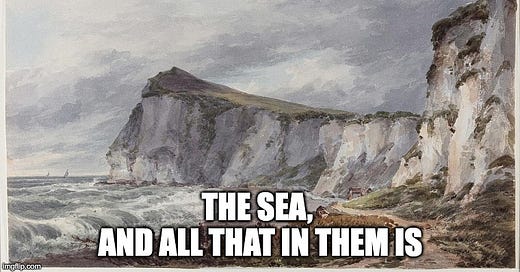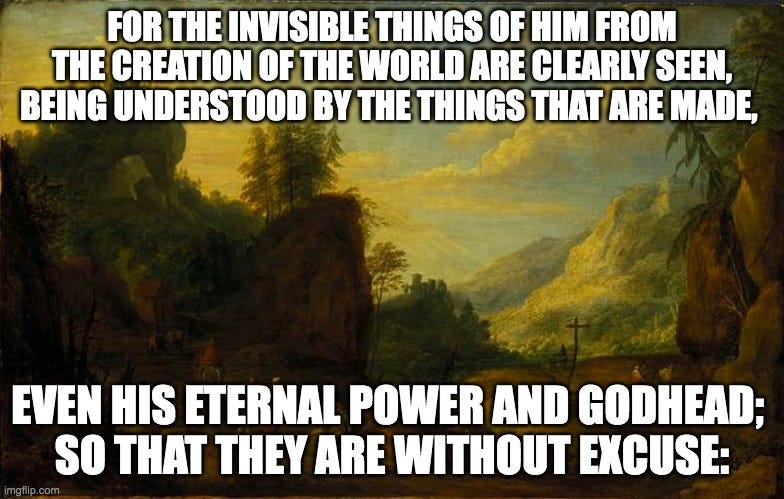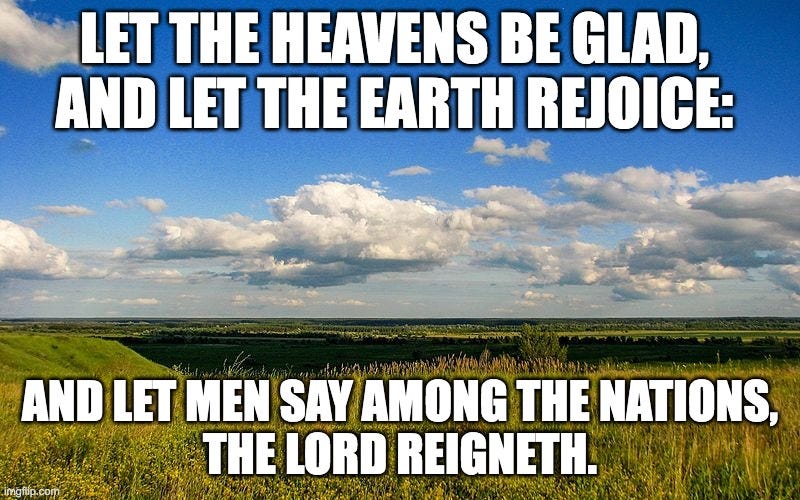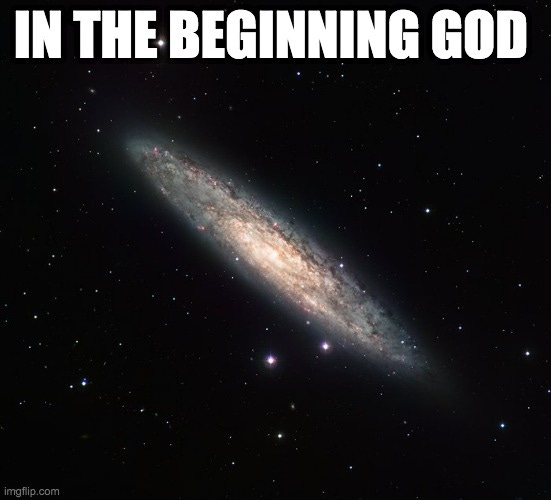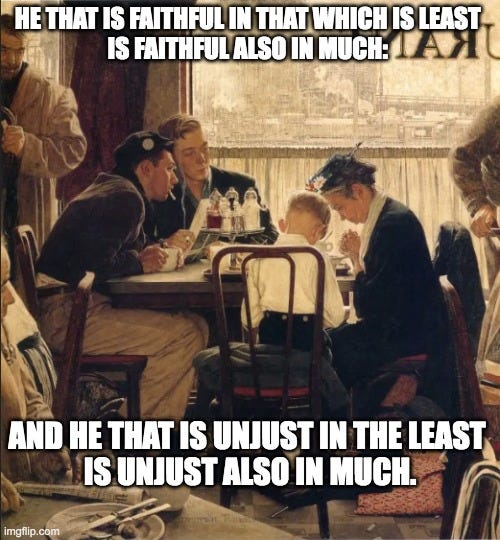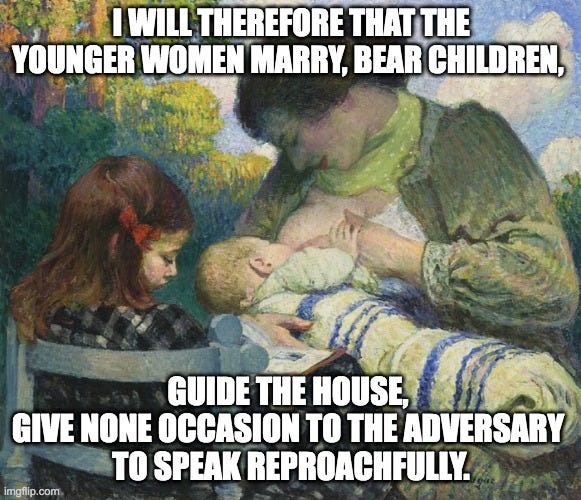Exo 31:17 It is a sign between me and the children of Israel for ever: for in six days the LORD made heaven and earth, and on the seventh day he rested, and was refreshed.
I am going to copy/paste some of those areas below, and lay out what I believe are the consequences.
Dogmatism
I hold my position loosely, not dogmatically. There are two reasons. First, it’s a secondary issue. That doesn’t mean it’s not important or meaningful. It means that getting it wrong doesn’t jeopardize anyone’s salvation
Tony Scialdone
In this quote there are three areas of difference:
I hold my position dogmatically
I don’t hold it as a secondary issue
I disagree on the meaning of ‘secondary issue’
Starting at the end, some of my understanding of his meaning here comes from his reference later to Romans 14. But I don’t believe in a ‘primary'/secondary’ distinction which hangs on ‘jeopardising’ salvation. I don’t believe that that is a helpful distinction, nor one that is made in Scripture. It is often read into Scripture, but I don’t find it in Scripture.
Thus I agree that it is important, and meaningful… and I would add that how we treat it will, often, trickle down into how we treat other issues.
Which is why I hold it dogmatically. Now, exactly what I hold dogmatically would need to be defined, but I hold it dogmatically :)
Twenty-four Hours
I do not teach that God created in six 24-hour days.
Tony
Nor do I, so my disagreement here is in that definition itself. I teach that God created the Heavens and Earth in six days; each of which had an evening and a morning, and on each of which God created certain things, as outlined in Genesis.
Those ‘evening and morning’ days, however, did not consist of lots of days, weeks, months, or years. The Earth did not revolve around the Sun hundreds or thousands of times (years). The moon did not revolve around the Earth millions of times (months). The Earth did not spin on its axis billions of times.
Responsible Science
O Timothy, keep that which is committed to thy trust, avoiding profane and vain babblings, and oppositions of science falsely so called:
I Timothy 6:20
I know of no situation where responsible scholarship in biblical studies and scientific endeavors conflict…
Tony
My problem with this statement is I don’t know if he meant to let the adjective ‘responsible’ carry over and modify ‘scientific’ or not. If it does, and if we agree that any science based on ‘methodological naturalism’ is irresponsible at its core, then we agree. Although I would prefer to say, “The Words of God” instead of ‘responsible Biblical studies’.
Contradictory
I believe the Bible is true, infallible, and inerrant in the original writings. I do not consider Genesis 1-11 to be highly symbolic or allegorical in nature. I believe in a real Adam and a real Eve in a real Garden. I do not believe that Darwin was correct about the origin of species, and I am not into theistic evolution.
Tony
So do/am I. I also believe that all of these beliefs contradict the idea that the days of creation were what are usually thought of as ‘ages’.
Yom
I say that God created the heavens and the earth in six YOMs, because that’s what the text says. Obviously, if we can get a YOM right, we can get the duration of the first 6 YOMs right as well.
Tony
I agree. With the caveat that, as far as I know, every responsible Bible translator has translated that Hebrew word ‘day’; and never transliterated it as yom. (Or put it in all caps, which for the KJV user would indicate that it is the sacred name of God.) Thus I would also be able to state those sentences with ‘day’.
As well in my study, and in my reading of the various Old Earth commentators, I have never found any uses of the word ‘Yom’ that would correspond to the use they wish to give it here. I am writing a post on that.
Use vs Definition
A YOM can be defined in any of these ways:
the daylight hours
the regular cycle of light and dark
an extended but finite period of time
a year
one’s lifetime
yesterday
today
tomorrow
a day’s work
a day’s journey
and more.
-Tony
[Note: SS will not let me put a list with bullets in it into a block quote. Sorry for the confusing format.]
I would change the above to read ‘The word ‘yom’ is used in Scripture to indicate the following things’, and then would go through and list some examples. And would hesitate to say ‘and more’ until I had found, umm, more.
IOW I would not use the word ‘definition’, which has an inappropriate denotative value wholly inapplicable to the Biblical corpus, and use the word ‘use’.
God v Moses
And he answered and said unto them, Have ye not read, that he which made them at the beginning made them male and female,
And said, For this cause shall a man leave father and mother, and shall cleave to his wife: and they twain shall be one flesh?
Wherefore they are no more twain, but one flesh. What therefore God hath joined together, let not man put asunder.
Matthew 19:4-6
…we have to discern Moses’ meaning for each use of YOM
Tony
I would substitute the word ‘God’ for the word ‘Moses’ here, in order to emphasise that God inspired these words, and that they are inerrant etc. It is true to say ‘Moses’, but I don’t think it is helpful in this case. Or one could say, “It is written…” to do the same thing, as Christ did. Or, as above, “Have you not read…?”
Certainty
Tit 1:9 Holding fast the faithful word as he hath been taught, that he may be able by sound doctrine both to exhort and to convince the gainsayers.
Titus 1:9
it seems unwise to pretend that our opinions carry the weight of certainty… both for our own sakes and for the sake of others.
Tony
This statement seems to have a veneer of truth, but it would need to be compared to other statements to be put ‘in its place’, as it were. Are we to apply it to Christ’s death on the cross, the virgin birth, the voyages of Paul? We hold each of those as ‘our opinion’ in at least one sense.
And in another sense we don’t. “It is written…”
Conclusion
Gird up now thy loins like a man; for I will demand of thee, and answer thou me.
Where wast thou when I laid the foundations of the earth? declare, if thou hast understanding.
Who hath laid the measures thereof, if thou knowest? or who hath stretched the line upon it?
Whereupon are the foundations thereof fastened? or who laid the corner stone thereof;
When the morning stars sang together, and all the sons of God shouted for joy?
Job 38:3-7
when all is said and done, you and those reading may see good reasons to accept that it’s possible to interpret the creation events in different ways, as long as they all conform to the text itself.
Tony
This has been a very quick and very light response to Tony’s comment. And hopefully a good beginning to a productive discussion. This post is by no means my entire reply to his comment. I have at least two more posts in the works :)
I would rephrase what he says at the end, like this, “… that both of us and those reading would have been informed, and studied, the importance of creation to the Biblical message, and come to a firm understanding of the doctrines, as they are taught in Scripture.”
We live in a world which rejects creation root and branch, and we see Christians casting doubt and shade on the doctrine continually. I would hope and pray that we both and our audience would be able to stand firm on the Word of God, and go into all the world to teach the gospel. Which, in the book of John, begins with creation…
In the beginning was the Word, and the Word was with God, and the Word was God.
The same was in the beginning with God.
All things were made by him; and without him was not any thing made that was made.
John 1:1-3
Appendix
original comment in full:Here’s a fresh thread for discussing the age of the earth according to Genesis.
[NOTE: anyone and everyone should feel free to add their two cents at any time, as long as it’s respectful and meaningful. Comments that don’t fit will be deleted.]
My Position (INTRO):
I hold my position loosely, not dogmatically. There are two reasons. First, it’s a secondary issue. That doesn’t mean it’s not important or meaningful. It means that getting it wrong doesn’t jeopardize anyone’s salvation. Second, there’s only one answer for the age of the earth/universe. I don’t know it with certainty, and I’m not convinced anyone else does either. Some people have probably hit the nail on the head, but that may be happenstance and not based on the text.
I lean toward an old-earth position NOT because I trust science more than the Bible, or more than God, but based on my understanding of the text. I know of no situation where responsible scholarship in biblical studies and scientific endeavors conflict, but science changes constantly. The Bible does not… so the text is primary, and the science is probably less than secondary.
My Position (DISCLAIMER):
I believe the Bible is true, infallible, and inerrant in the original writings. I do not consider Genesis 1-11 to be highly symbolic or allegorical in nature. I believe in a real Adam and a real Eve in a real Garden. I do not believe that Darwin was correct about the origin of species, and I am not into theistic evolution.
My Position (TECHNICAL):
I do not teach that God created in six 24-hour days. I also do not teach that God created in six longer periods of time. I say that God created the heavens and the earth in six YOMs, because that’s what the text says. Obviously, if we can get a YOM right, we can get the duration of the first 6 YOMs right as well.
My Understanding of a YOM:
A YOM can be defined in any of these ways:
the daylight hours
the regular cycle of light and dark
an extended but finite period of time
a year
one’s lifetime
yesterday
today
tomorrow
a day’s work
a day’s journey
and more.
[As mentioned above, SS will not allow bulleted lists in quotes.]
Because this is true, we have to discern Moses’ meaning for each use of YOM. That is the only responsible way to handle the text. I’ve pasted Strong’s full definition below. It’s very instructive.
If we can accurately discern Moses’ intent, we can apply it to the text. If we can’t, my strong position is that we should avoid picking the meaning we prefer, to the exclusion of any other option. There’s nothing wrong with having an opinion, but it seems unwise to pretend that our opinions carry the weight of certainty… both for our own sakes and for the sake of others.
Romans 14 addresses the disunity that comes from dividing over disputable matters. The examples Paul uses are ‘special days’ and dietary restrictions. We (in Paul’s words) should “accept the one whose faith is weak, without quarreling over disputable matters.” The endless arguments about who’s right in this area hold no interest for me for this specific reason. There’s usually far more heat than light, and virtually never a conclusion.
My relationship with you as my brother is more important than convincing you that you’re wrong, especially when I don’t know that you’re wrong about a disputable matter. For that reason, I hope that the outcome of this discussion will have no impact on our relationship beyond benefiting us both.
I do expect that you’ll provide evidence for your view, and I will likely respond to each as I can. I don’t expect to change your mind. What I do expect is that, when all is said and done, you and those reading may see good reasons to accept that it’s possible to interpret the creation events in different ways, as long as they all conform to the text itself.
Strongs:
יוֹםyôwm, yome; from an unused root meaning to be hot; a day (as the warm hours), whether literal (from sunrise to sunset, or from one sunset to the next), or figurative (a space of time defined by an associated term), (often used adverb):—age, always, chronicals, continually(-ance), daily, ((birth-), each, to) day, (now a, two) days (agone), elder, × end, evening, (for) ever(-lasting, -more), × full, life, as (so) long as (... live), (even) now, old, outlived, perpetually, presently, remaineth, × required, season, × since, space, then, (process of) time, as at other times, in trouble, weather, (as) when, (a, the, within a) while (that), × whole ( age), (full) year(-ly), younger.
Thank you for reading Von’s Substack. I would love it if you commented! I love hearing from readers, especially critical comments. I would love to start more letter exchanges, so if there’s a subject you’re interested in, get writing and tag me!
Being ‘restacked’ and mentioned in ‘notes’ is very important for lesser-known stacks so… feel free! I’m semi-retired and write as a ministry (and for fun) so you don’t need to feel guilty you aren’t paying for anything, but if you enjoy my writing (even if you dramatically disagree with it), then restack, please! Or mention me in one of your own posts.
If I don’t write you back it is almost certain that I didn’t see it, so please feel free to comment and link to your post. Or if you just think I would be interested in your post!
If you get lost, check out my ‘Table of Contents’ which I try to keep up to date.
Thanks again, God Bless, Soli Deo gloria,
Von
Links
I have written several posts about Creation and Evolution.
and I were hoping for it to evolve into a letter exchange, but so far he has only commented.
